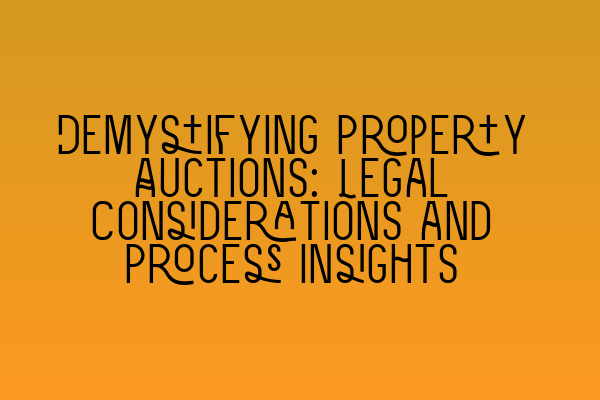Demystifying Property Auctions: Legal Considerations and Process Insights
Property auctions have gained popularity in recent years as an alternative way to buy and sell properties. The excitement and potential for a bargain make auctions an attractive option for both investors and homebuyers. However, navigating the legal complexities of property auctions can be challenging without the right knowledge and guidance.
In this blog post, we will demystify property auctions by providing a detailed overview of the legal considerations and process insights that every prospective buyer or seller should be aware of. Whether you are a first-time auction attendee or a seasoned investor, understanding the legal aspects of property auctions is crucial for making informed decisions and safeguarding your interests.
Understanding Property Auctions
Property auctions are public events where buyers bid on properties. These auctions can be held in-person or online, and they usually involve properties that are being sold by individuals, banks, or other organizations. The primary advantage of buying at an auction is the potential to acquire a property below market value.
However, before diving into the auction process, it is essential to understand the legal considerations involved. Property auctions come with their own set of rules and regulations, which must be followed to ensure a fair and transparent transaction.
Legal Considerations for Property Auctions
1. Research the Property: Before participating in a property auction, thoroughly research the property you are interested in. Obtain the legal pack and review it carefully. The legal pack includes vital information such as the title deeds, searches, special conditions of sale, and any other relevant legal documents.
2. Arrange Financing: It is important to arrange financing beforehand as most auctions require immediate payment of the deposit (usually 10% of the purchase price) upon successfully winning the bid. You may also need to provide proof of funds or a mortgage agreement in principle.
3. Appoint a Solicitor: Engaging a solicitor with experience in property auctions is crucial. They can review the legal pack, advise you on important legal issues, and handle the necessary paperwork. Using a solicitor who specializes in property auctions will give you peace of mind and ensure that your interests are protected throughout the process.
4. Pre-Auction Due Diligence: Conduct thorough due diligence on the property in question. This may involve physical inspections, obtaining surveys, and assessing any potential risks or liabilities associated with the property.
5. Understand Auction Terms and Conditions: Each auction will have its own terms and conditions, which you must familiarize yourself with. These conditions outline the auction process, bidding increments, buyer’s fees, and other important details. Pay close attention to any special conditions of sale, as they may impact the terms of the transaction.
6. Legal Checks and Searches: Ensure that all necessary legal checks and searches have been conducted. These include title searches, environmental searches, and other relevant investigations. Your solicitor will guide you through the process and ensure that you have a comprehensive understanding of the property’s legal status.
The Property Auction Process
Now that we have covered the legal considerations, let’s delve into the property auction process itself. While the specifics may vary depending on the auctioneer and the type of auction, there are generally six key stages:
1. Catalogue:
The auctioneer produces a catalogue containing the details of all properties available for sale. The catalogue is usually made available a few weeks before the auction date, and prospective buyers can study the properties and undertake their due diligence.
2. Registration:
Before entering the auction, participants must register. This involves providing identification and agreeing to the auctioneer’s terms and conditions.
3. Pre-Auction Viewing:
Prior to the auction, there may be opportunities to view the properties. These viewings allow potential buyers to inspect the properties and assess their suitability. It is advisable to attend these viewings accompanied by your solicitor.
4. Auction Day:
On the day of the auction, participants gather at the designated venue or join the virtual auction online. The auctioneer will introduce each property, state its guide price, and begin the bidding process. Bids are made by raising a hand, nodding, or using bidder cards (online auctions may have different mechanisms).
5. Successful Bid:
If your bid is successful, you will be declared the buyer. At this point, you may need to pay the deposit immediately and provide your solicitor’s details to the auctioneer. It is crucial to have your solicitor present during the auction to handle all legal requirements and ensure a smooth transition.
6. Completion:
Upon successfully winning the bid, completion typically occurs within a specified timeframe. This timeframe is usually tight, with completion taking place within 28 days. It is crucial to work closely with your solicitor to ensure all necessary legal procedures are followed, and any outstanding issues are resolved promptly.
While this provides a general overview of the property auction process, it is important to note that individual auctions may have specific variations and requirements. Therefore, it is always recommended to conduct thorough research and seek professional advice from a solicitor experienced in property auctions.
Conclusion
Property auctions can be an excellent way to buy or sell properties, but it is essential to understand the legal considerations and process insights to navigate the auction successfully. By following the legal guidelines we have outlined, conducting thorough due diligence, and engaging an experienced solicitor, you can mitigate risks and maximize the potential benefits of property auctions.
If you are preparing for the SQE exams, we offer a range of preparation courses and practice materials. Check out our SQE 1 Practice Exam Questions and SQE 1 Practice Mocks FLK1 FLK2 for comprehensive practice.
For more information on the SQE exams and important dates, visit our SRA SQE Exam Dates page.
